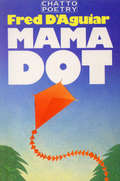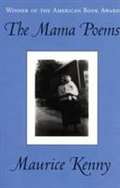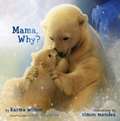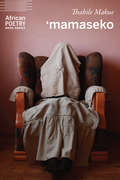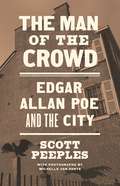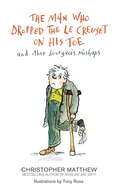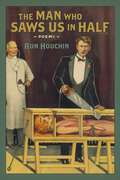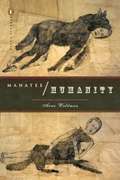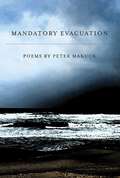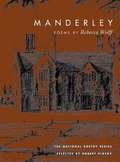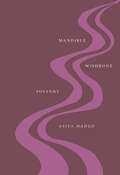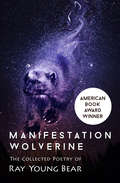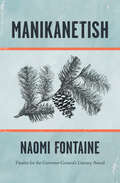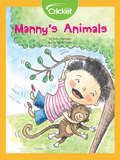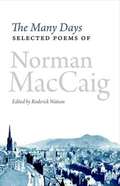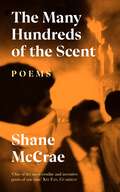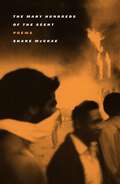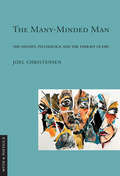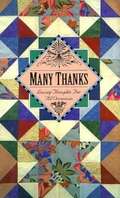- Table View
- List View
Male Madeshwara: A Kannada Oral Epic
by K. Keshavan Prasad C. N. Ramachandran L. N. BhatCollected by K. Keshavan Prasad, Translated by C. N. Ramachandran & L. N. Bhat.
Mama Dot
by Fred D'aguiarEvery once in a while, a new poet appears who makes us feel that the contours of contemporary poetry have been significantly changed. Fred D'aguiar is such a poet. Although still in his early twenties, he already has a wholly independent voice, and a powerful grasp of original and strange subjects. Many of these arise from his childhood in Guyana: the first section of Mama Dot comprises a series in which these early years are recalled with a passionately lyrical evocation of landscapes, incidents and family relations. They are sensuous celebrations, but are nevertheless touched with melancholy and nostalgia – qualities which are more fully evident elsewhere in the book, in poems which address the life D’Aguiar now leads in England, and which concentrate on themes of exile. In the final section, ‘Guyanese Days’, he returns once again to the scenes and memories of his childhood. Mama Dot is one of the most exciting first collections to have been published for many years: exhilarating, haunting and restlessly inventive.
The Mama Poems
by Maurice Kenny"The world [Maurice] Kenny opens for us is personal, yet never sentimental. It is a world in which long-dead relatives can appear when they are needed; in which the drum sounds in rituals of curing; a world vibrant with the natural landscape."-Joseph Bruchac, Small Press Review In conjunction with the publication of Connotations, we are pleased to release a new edition of American Book Award winner Maurice Kenny's The Mama Poems, a cycle of poems centered on the life of Kenny's late mother. Maurice Kenny is one of the major voices of Native American letters. His books of poetry include Tekonwatonti: Molly Brant and Carving Hawk.
Mama, Why?
by Karma WilsonAges 3-7. The day is done. Night is nigh. And Polar Cub asks, "Mama, why?" The moon is high. The stars are bright. And Polar Cub asks, "Mama, why?" It's time for sleep. It's time for dreams. And Polar Cub asks, "Mama, why?" Share in this glowing, timeless lullaby from beloved, bestselling author Karma Wilson and award-winning illustrator Simon Mendez Picture descriptions present.
‘mamaseko (African Poetry Book)
by Thabile MakueNamed after the poet&’s mother, &‘mamaseko is a collection of introspective lyrics and other poems dealing with the intersections of blood relationships and related identities. Thabile Makue questions what it means to be beings of blood—to relate by blood, to live by blood. In her poems Makue looks for traces of shared trauma and pain and asserts that wounds of the blood are healed by the same.
The Man of the Crowd: Edgar Allan Poe and the City
by Scott PeeplesHow four American cities shaped Poe's life and writingsEdgar Allan Poe (1809–1849) changed residences about once a year throughout his life. Driven by a desire for literary success and the pressures of supporting his family, Poe sought work in American magazines, living in the cities that produced them. Scott Peeples chronicles Poe's rootless life in the cities, neighborhoods, and rooms where he lived and worked, exploring how each new place left its enduring mark on the writer and his craft.Poe wrote short stories, poems, journalism, and editorials with urban readers in mind. He witnessed urban slavery up close, living and working within a few blocks of slave jails and auction houses in Richmond and among enslaved workers in Baltimore. In Philadelphia, he saw an expanding city struggling to contain its own violent propensities. At a time when suburbs were just beginning to offer an alternative to crowded city dwellings, he tried living cheaply on the then-rural Upper West Side of Manhattan, and later in what is now the Bronx. Poe's urban mysteries and claustrophobic tales of troubled minds and abused bodies reflect his experiences living among the soldiers, slaves, and immigrants of the American city.Featuring evocative photographs by Michelle Van Parys, The Man of the Crowd challenges the popular conception of Poe as an isolated artist living in a world of his own imagination, detached from his physical surroundings. The Poe who emerges here is a man whose outlook and career were shaped by the cities where he lived, longing for a stable home.
The Man Who Dropped the Le Creuset on His Toe and Other Bourgeois Mishaps
by Christopher MatthewThe path trodden by the middle-aged middle classes in Britain, smooth though it may appear to the less privileged, is in reality a peculiarly dangerous one, dogged by its own set of terrors, pitfalls and opportunities for social humiliation. In The Man Who Dropped the Le Creuset on his ToeChristopher Matthew follows up the huge success of Now We Are Sixty with a collection of mordant, witty, cautionary verses on the subject of the British bourgeoisie and its foibles and failings.Not only can expensive, enamelled, cast-iron cookware be very dangerous in the wrong hands, but so too can Pilates, open-air opera in evening dress, weekending in Wales with a pug, gastro-tourism in Tuscany, the mid-life parachute jump as an alternative to physiotherapy, and pushing a trolley in Waitrose.As for the middle-aged Lothario's quest for a younger, Mark Two model, this can all too often end in ignominy rather than fun and games and feather boas in Cap Ferrat.Sharply observed and gloriously mischievous, The Man Who Dropped the Le Creuset on his Toe gently punctures the pride and sense of entitlement enjoyed by the pesto-loving middle classes.
The Man Who Dropped the Le Creuset on His Toe and Other Bourgeois Mishaps
by Christopher MatthewThe path trodden by the middle-aged middle classes in Britain, smooth though it may appear to the less privileged, is in reality a peculiarly dangerous one, dogged by its own set of terrors, pitfalls and opportunities for social humiliation. In The Man Who Dropped the Le Creuset on his ToeChristopher Matthew follows up the huge success of Now We Are Sixty with a collection of mordant, witty, cautionary verses on the subject of the British bourgeoisie and its foibles and failings.Not only can expensive, enamelled, cast-iron cookware be very dangerous in the wrong hands, but so too can Pilates, open-air opera in evening dress, weekending in Wales with a pug, gastro-tourism in Tuscany, the mid-life parachute jump as an alternative to physiotherapy, and pushing a trolley in Waitrose.As for the middle-aged Lothario's quest for a younger, Mark Two model, this can all too often end in ignominy rather than fun and games and feather boas in Cap Ferrat.Sharply observed and gloriously mischievous, The Man Who Dropped the Le Creuset on his Toe gently punctures the pride and sense of entitlement enjoyed by the pesto-loving middle classes.
The Man Who Saws Us in Half: Poems (Southern Messenger Poets)
by Ron HouchinThrough silence and song, death and rebirth, a sense of wonder pervades every minute of our lives. In The Man Who Saws Us in Half, Ron Houchin explores this idea from the first curiosities of childhood to the gradual skepticism that comes with age and the weight of practical concerns. In the whimsical poem "The Lion That Finds You Asleep in His Dream," the sleeping figure relives the magical allure of youth, offered both gratuitously and ubiquitously: "The moon's still high in its arc, / and you know / you spilled from this lion's heart." With his unique and colloquial voice, Houchin allows the reader to experience familiar subjects anew, to admire the surrounding world with rekindled appreciation and awe.
Manatee/Humanity
by Anne WaldmanA fascinating new work from an internationally renowned poet Anne Waldman's new investigative hybrid-poem explores the nuances of inter-species communication and compassion. It draws on animal lore, animal encounters (with grey wolf and manatee), dreams, evolutionary biology, neuroscience, and Buddhist ritual to render a text of remarkable sympathy, reciprocity, and power. The poem asks questions as well as urges further engagement with the endangered (including our human selves). Part performance litany, part survival kit, part worried mammalian soundings, Waldman explores, as ever, what it means to inhabit our condition through language and imagination inside a wheel of time. This is the mature work of a philosophical field poet with a shamanic metabolism.
Mandatory Evacuation
by Makuck PeterThrough lyrical narrative, the poems in Mandatory Evacuation find radiance in everyday people and subjects by the simple act of noticing-of seeking that which matters most. Like returning home with new eyes after a devastating storm, these poems startle us to awareness, focusing on the passage of time, the beauty of small, fleeting moments, and the importance of paying attention.
Manderley: POEMS
by Rebecca WolffSelected by Robert Pinsky as one of five volumes published in 2001 in the National Poetry Series In the Manderley of Rebecca, Daphne du Maurier's forbidding haven of mocking ghosts and secrets that refuse to remain buried, nothing is as it seems. So in this stunning debut collection by Rebecca Wolff, cities, partners, mothers, sisters, friends, and perfect strangers all disguise their true faces, while they who seek connection are "transported from one great gaping / hole in the fabric / of our knowledge to another." No passage is too dark, no garden too tangled for the troubled dreamer of Manderley. Wolff turns a quicksilver gaze on a fluid world where both the real and the imaginary are transfigured. Tempering steely candor with a sophisticated delight in wordplay, these poems turn on a dime from the sensual to the eerie, the resigned to the hopeful, the comforting to the shocking. Each poem weaves together layers of dream, remembrance, and fantasy, distilling from romantic excess a gritty, spare language of truth-telling and surprise
Mandible Wishbone Solvent (Phoenix Poets)
by Asiya WadudA poetry collection that brings together word, image, and sound to reflect on fractured, fragmentary states of being. The poetry of Mandible Wishbone Solvent is situated in the space of bridges, fragmentary overlays, spectral reach, and the desire to keep reaching. Asiya Wadud’s poems engage in this act, not to stake a claim or to fasten themselves, but to hold fragments together in order to offer possibilities for connection and extension. Throughout the collection lies an acknowledgment that any hold will drift, meander, and find new paths, with each separation making space for new entanglements. Drawing on a keen interest in tactility and ekphrasis, Wadud mines the repetition and extension that comes with any fractured state of existence and considers the nature of a residual and roving we. Following this selection of lyrical, ekphrastic, fragmented poems, the book concludes with two prose pieces that dwell on the concepts of “isthmus” and “drift,” respectively, which offer further grounds for contemplation and provide a frame for the poems.
Manifestation Wolverine: The Collected Poetry of Ray Young Bear
by Ray Young BearThe definitive collection from a groundbreaking Native American poet whose work traces the fault lines between past and present, real and surreal, comedy and tragedy to unveil a transcendent new vision of the world Hailed by the Bloomsbury Review as "the nation's foremost contemporary Native American poet" and by Sherman Alexie as "the best poet in Indian Country," Ray Young Bear draws on ancient Meskwaki tradition and modern popular culture to create poems that provoke, astound, and heal. This indispensable volume, which contains three previously published collections--Winter of the Salamander (1979), The Invisible Musician (1990), and The Rock Island Hiking Club (2001)--as well as Manifestation Wolverine, a brilliant series of new pieces inspired by animistic beliefs, a Lazy-Boy recliner, and the word songs Young Bear sang to his children, is a testament to the singularity of the poet's talent and the astonishing range of his voice.
Manikanetish
by Naomi FontaineIn Naomi Fontaine’s Governor General’s Literary Award finalist, a young teacher’s return to her remote Innu community transforms the lives of her students, reminding us of the importance of hope in the face of despair. After fifteen years of exile, Yammie, a young Innu woman, has come back to her home in Uashat, on Quebec’s North Shore. She has returned to teach at the local school but finds a community stalked by despair. Yammie will do anything to help her students. When she accepts a position directing the end-of-year play, she sees an opportunity for the youth to take charge of themselves. In writing both spare and polyphonic, Naomi Fontaine honestly portrays a year of Yammie’s teaching and of the lives of her students, dislocated, embattled, and ultimately, possibly, triumphant.
Manjeer
by Nandkishore NavalManjeer is a collection of small poems written by Nand Kishore Aggarwal. The poet has expressed his anger in the poems in a simple and effective language.
The Many Days: Selected Poems of Norman McCaig
by Norman MacCaigA centennial celebration of the Scottish poet. &“[A] testament to his apperception and skill in crafting verse on the impulse of things seen and thought.&” —PN Review By the time of his death in January 1996, Norman MacCaig was known widely as the grand old man of Scottish poetry, honored by an Order of the British Empire (OBE) and the Queen&’s Medal for Poetry. This book is a celebration of MacCaig&’s life—published in 2010, the hundredth anniversary of his birth—and it features 100 of his best poems, edited by his son Ewen.Praise for Norman MacCaig &“I have always loved the mixture of strictness and susceptibility in Norman MacCaig&’s work. It is an ongoing education in the marvelous possibilities of lyric poetry.&” —Seamus Heaney &“I have read or re-read every poem (in the Collected Poems), and I think it one of the greatest literary experiences of my life.&” —Sorley MacLean &“Whenever I read his poems, I&’m always struck by their undated freshness; everything about them is alive, as new and essential, as ever.&” —Ted Hughes
The Many-Headed Muse
by Pauline A. LevenThis is the first monograph entirely devoted to the corpus of late-classical Greek lyric poetry. Not only have the dithyrambs and kitharodic nomes of the New Musicians Timotheus and Philoxenus, the hymns of Aristotle and Ariphron, and the epigraphic paeans of Philodamus of Scarpheia and Isyllus of Epidaurus never been studied side by side, they have also remained hidden behind a series of critical prejudices - political, literary and aesthetic. Professor LeVen's book provides readings of these little-known poems and combines engagement with the style, narrative technique, poetics and reception of the texts with attention to the socio-cultural forces that shaped them. In examining the protean notions of tradition and innovation, the book contributes to the current reevaluation of the landscape of Greek poetry and performance in the late classical period and bridges a gap in our understanding of Greek literary history between the early classical and the Hellenistic periods.
The Many Hundreds of the Scent
by Shane McCraeShane McCrae, one of the most powerful voices in contemporary poetry, returns with The Many Hundreds of the Scent, an urgent new collection that brims with lyric force. He expands both the poetic and the personal mythologies that he has been constructing over the course of his career; in addition to introducing his readers to 'the thin king / who eats the world,' McCrae invites them to bear witness to his tangle of childhood memories. In brutal, sorrowful lines, he recounts being kidnapped by his white supremacist maternal grandparents from his Black father as a boy. 'O reader, listener, stay,' McCrae writes. 'You are now evidence.'In The Many Hundreds of the Scent, Homeric figures mingle with those that populate the poet's world. Helen weighs Paris's spear in her hand and bloodies a raging Achilles; Penelope burns her loom each night; Dido watches Aeneas's ship burn on the horizon. A strikingly original and engaging poet, McCrae continually surprises - the collection includes a series of poems about the advent of post-rock and Hex, the debut album of the band Bark Psychosis. With this collection, he has once more crafted an extraordinarily affecting book of poetry. As Kate Kellaway writes in the Guardian, 'In McCrae's hands, poetry is reclamation. It is also transport: writing a way out and through.'
The Many Hundreds of the Scent: Poems
by Shane McCraeA stunning new collection of poetry from Shane McCrae, winner of the Whiting Writers' Award.Shane McCrae, one of the most powerful voices in contemporary poetry, returns with The Many Hundreds of the Scent, an urgent new collection that brims with lyric force. He expands both the poetic and the personal mythologies that he has been constructing over the course of his career. In addition to introducing his readers to “the thin king / who eats the world,” McCrae invites them to bear witness to his tangle of childhood memories. In brutal, sorrowful lines, he recounts being kidnapped by his white supremacist maternal grandparents from his Black father as a boy. “O reader, listener, stay,” McCrae writes. “You are now evidence.”In The Many Hundreds of the Scent, Homeric figures mingle with those who populate the poet’s world. Helen weighs Paris’s spear in her hand and bloodies a raging Achilles; Penelope burns her loom each night; Dido watches Aeneas’s ship burn on the horizon. A strikingly original and engaging poet, McCrae continually surprises—the collection includes a series of poems about the advent of post-rock and Hex, the debut album of the English band Bark Psychosis. With this collection, he has once more crafted an extraordinarily affecting book of poetry. As Kate Kellaway writes in The Guardian, “In McCrae’s hands, poetry is reclamation. It is also transport: writing a way out and through.”
The Many-Minded Man: The "Odyssey," Psychology, and the Therapy of Epic (Myth and Poetics II)
by Joel ChristensenIn The Many-Minded Man, Joel Christensen explores the content, character, and structure of the Homeric Odyssey through a modern psychological lens, focusing on how the epic both represents the workings of the human mind and provides for its audiences—both ancient and modern—a therapeutic model for coping with the exigencies of chance and fate.By reading the Odyssey as an exploration of the constitutive elements of human identity, the function of narrative in defining the self, and the interaction between the individual and their social context, The Many-Minded Man addresses enduring questions about the poem, such as the importance of Telemachus's role, why Odysseus must tell his own tale, and the epic's sudden and unexpected closure. Through these dynamics, Christensen reasons, the Odyssey not only instructs readers about how narrative shapes a sense of agency but also offers solutions for avoiding dangerous stories and destructive patterns of thought.
Many Thanks: Loving Thoughts for All Occasions
by Lisa PalasA collection of well over 100 beautiful, wise and exuberant quotes and verses featuring numerous aspects of thankfulness for love, gifts, family, friendship, nature, contentment, life and more. Reading them is uplifting. They can help you to express thanks to others, or can be shared to spread the pleasure. They are drawn from a variety of sources including historical figures, proverbs, poets, the bible and other religious texts, and from people you may not know but whose thoughts are treasures. From the dust jacket: This book says thank you to friends for their support and goodwill, to family members for their love, and to friends for their undying devotion. Charles Dickens said, A loving heart is the truest wisdom.

